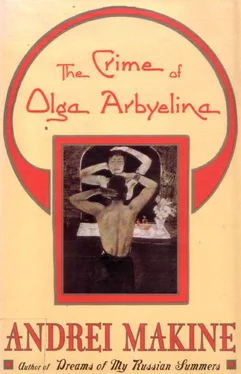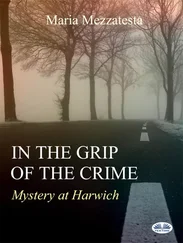In the late autumn of 1946 her house seemed even more remote than usual from both the Caravanserai and the town; alien to the world. The rains isolated it, transforming the track that led around the wall into a dotted line of tufts of grass. Then came the cold that began to blanket this ephemeral pathway in hoarfrost. The power cuts announced regularly by the newspapers became no more unusual than the flickering of candles at the dark windows of the Caravanserai.
The thoughts and fears that had so tortured her during the preceding months had now been transmuted into a silent dialogue imagined between herself and Li. She confided to her friend, who was very understanding, as our partners in these imaginary conversations always are, that when young she felt she was living not for the sake of living but to prove to somebody that she was free to change the course of her life on a simple whim. Whim! Yes, her whole youth had been corroded by this restlessness, this posturing frenzy, this lust for defiance, for provocation, for negation. A life mistaken, spoiled, led astray, badly begun… No doubt Li would find the right word for it.
These silent dialogues were nothing other than brief interludes within the fabric-at once dense and transparent-through which she viewed everything in this world: the life of her son. She finally accepted him in the guise of the adolescent who had appeared to her one September evening, so composed, so discreet he hardly seemed to be there. Sometimes the tissue of her thoughts, from which the boy was never absent, grew denser and she felt stifled: this was on those occasions, often unexpected, when his illness returned.
She had had the same feeling of suffocation during the latest consultation with the doctor. This dry and almost disagreeable man pleased her. With him she had no fear that the worst might be hidden from her… This time there were discordant notes in the tenor of the rather clumsy words of encouragement he addressed to the boy. She thought she could detect the consciously adopted tone designed to restore the confidence of an elderly invalid. A patient, in fact, whose decline is being closely monitored and to whom the physician promises several more years, with the openhandedness of a benefactor.
Next day there was another power cut. She was delighted: in the dim light at the library the traces of anguish left on her face caused by her conversation with the doctor would be harder to discern. The readers departed. She remained for a long moment at the window, and darkness fell as she watched. In the dusk a little point of light advanced slowly across the vast inner courtyard of the Caravanserai. Some elderly resident, for sure, candle in hand, making a visit to a friend who lived in the opposite wing of the building. In the wind an eddy of dead leaves swirled in broad circles along the walls, drawing with it the whirling pages of a newspaper. In the middle of the courtyard the little light stopped. Another figure could be made out dimly, face to face with the candle carrier. Their heads bent over the flame shielded by a feeble, almost translucent hand… This meeting in the autumn wind over that fragile flame, Olga told herself, was perhaps a faint echo of the dream cherished by the original occupants of the Caravanserai.
It was another day spent without light… A Saturday. The week that had preceded it was punctuated with cold showers that glazed the dull air. During the final night this fluid glass had congealed. The earth covered in frozen footprints and ruts as hard as stone made walking painful. The readers hastened to go home while they could still dimly see where they were putting their feet in the courtyard that bristled with sharp little ridges of frozen earth…
As Olga emerged from the Caravanserai, she noticed how few and far between the windows were where candles flickered; she mused on this strange fortress that emptied more and more each year. At length, feeling her way across the unevenness of the earth, she slowly embarked upon her regular journey. First along an alleyway in the lower town, then around the walls of the old brewery… Reaching the corner of her house, she sensed that an indefinable change had just taken place in nature. A timid softening, a dull, silent relaxation. Even the tonality of the air was different-filled with a hazy, mauve luminosity. At midday the wind had still been blinding her with needles of tears: now it had dropped. Beyond the willow branches the river had the consistency of ink. And, with an old familiar joy, Olga recognized that moment of expectation, when nature holds its breath, that in her childhood days would herald the swirling of snow…
She saw it through the little open window below the bathroom ceiling. The snowflakes entered the warm penumbra and vanished in a brief iridescent glitter. The silence was such that you could hear the rustling of the candle placed on the great porous slabs of the floor…
She was drinking tea, her gaze lost in the wavering orange halo around the wick, when someone knocked on the door. Surprised, but not really, by this late visit, she walked down the corridor carrying the candle, her steps keeping time with the flickering of the flame. It was eleven o'clock in the evening. Only a Russian could appear so late with no other reason than a desire to talk. Or a Frenchman, but then with an urgent, serious reason. At the last minute the idea occurred to her that it might be a prowler. She turned the key, calling out an automatic "Who's there?" and opened the door. The candle blew out. There was nobody… She went out onto the steps and even took several paces along beside the wall, as if to assuage a slight pang of anxiety. Nobody. The snowflakes were drifting sleepily in the gray air, giving off a spellbinding, ashen light. The earth was already half white. This, more than anything, was what lit up the night. Under snow, the meadow seemed more vast, and at each breath she took this emptiness entered her chest with a chill that was piquant and bitter. And remembered from a very long time ago.
Without abandoning her reverie, she slowly drank the tea that was scarcely warm now, and went into her bedroom. The scent of the bark burning in the stove was intoxicating. She went to draw back the curtains and fill the room with the blue reflection of the snow… But she moved too abruptly. One of the rings, a heavy bronze ring, fell onto the carpet. The room seemed to be cut into two halves, one bathed in milky whiteness, the other darker than usual. She pulled up a chair. Then thought she must first find the curtain ring. Bent down. Realized that without a candle she could not see clearly enough in this dark half of the room… Suddenly she felt herself overtaken by a pleasant lassitude that confused her in the sequence of her movements: seek, light, climb on chair, replace. No, first light the candle… or pick up the curtain ring… Her strength failed her. A rapid drowsiness was already making her eyelids heavy, relaxing her body. The pearly brilliance of the snow bewitched her. She moved away from the window. The edge of the bed rose up behind her, made her knees give way. She sat down. Staying awake was now demanding an increasingly concentrated effort. She still believed it was the snow, the aroma of the burning bark, the intensity of her memories that had plunged her into this fog of tiredness. She lay down, undid the belt of her dressing gown. These actions were carried out more and more slowly, like the final few steps of a figurine on a music box. She teetered on the slippery brink of sleep in the absolute certainty that at all costs she must make these few waking moments last…
He came into the room when she was in the ultimate stage of consciousness. The stage when for the last time the drowning swimmer manages to return to the surface, to see the sun, the sky, his life, still so close…
Читать дальше












